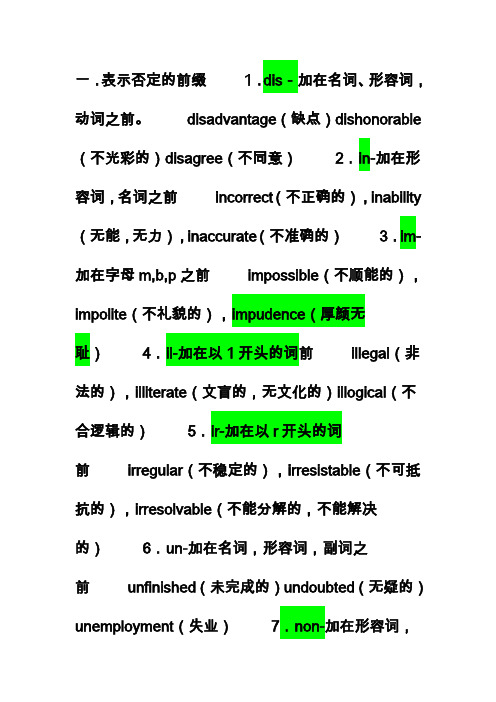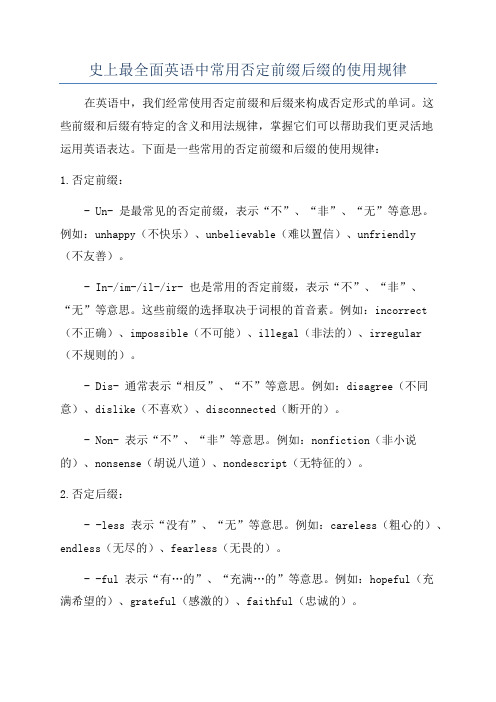英文中常用否定前缀总结
表否定的前缀

一.表示否定的前缀1.dis-加在名词、形容词,动词之前。
disadvantage(缺点)dishonorable (不光彩的)disagree(不同意)2.in-加在形容词,名词之前incorrect(不正确的),inability (无能,无力),inaccurate(不准确的)3.im-加在字母m,b,p之前impossible(不顺能的),impolite(不礼貌的),impudence(厚颜无耻)4.il-加在以1开头的词前illegal(非法的),illiterate(文盲的,无文化的)illogical(不合逻辑的)5.ir-加在以r开头的词前irregular(不稳定的),irresistable(不可抵抗的),irresolvable(不能分解的,不能解决的)6.un-加在名词,形容词,副词之前unfinished(未完成的)undoubted(无疑的)unemployment(失业)7.non-加在形容词,名词前non-existence(不存在),non-essential (不主要的),non-electrical(非电的)8.mis -加在动词、名词之前misunderstand(误解),misjudge(误判),misleading(误导),misfortune (不幸)9.dis-加地动词之前disappear (消失),disarm(解除武装),disconnect(失去联系)10.de-加在名词,形容词之前demobilize(遣散;使…复员) decolor (脱色, 漂白)11.anti-加在名词、形容词之前anti-Japanese(抗日战争),anti-social(厌恶社会的,反社会的),antidite(解毒药)12.counter-加在名词、动词前counterattack(反攻,反击),counteract(抵抗,阻碍)counterrevolution(反革命)二.表示“前before”的前缀1.pre-preconception(成见),pre-exsiting(先于……而存在的),pre-selection (选举前的)preface(前言)2.Ante-anteroom(前室,接待室),antecessor(先行者,先驱者)3.Fore-forehaed(前额),foreground (前景),foreman(工头,领班),foresee(预见,先见),foretell(预言)4.Pro-programme (计划),prologue(序幕)5.Ex-ex-president(前任总统)ex-wife (前妻)三.表示“后-post”的前缀1.post-post-war(战后),post-position (后置词),postmeridian(下午)四.表示“低”、“下”的前缀1.Hypo-Hypocrisy(伪善,虚伪),hypothesis(假设),pypocholoride(次氯酸盐)2.Infra-Infra-red(红外线),infrahuman(低于人类的),infrasonic(亚声的,次声的)3.Sub-Sub-editou(副编辑),sub-way(地铁),sub-conscious(下意识的),submarine(海下的),subtropical(亚热带的),subtitle (副标题)五.表示“回”、“再次”、“向后”的前缀1.Re-Refuel(给…加油),retranslate (再译),reinforce(加强),reconstruct(重建),return(返回)2.Retro-Retrograde(倒退的),retrospect(回顾)六.表示“共同”、“和”的前缀1.Co-co-exist(共存),co-operate (合作),co-education(男女同校)七.表示“相互”、“之间”的前缀1.Inter-Interchangeble(可互换的),interdipendert(互相依靠的),international(国际的),inter-national(交往)八. 表示“出”、“超出”的前缀1.Ec-Eclipse(蚀),ecstasy (狂想)2.Extra-Extraordinary(非凡的),extramural(校外的),extrasensory(超感觉的)九.表示“超过”的前缀1.hyper-, preter-, super-, sur-, ultra-hyper-sensitive(过敏的),preterhuman(超人的)十.其它的前缀1.auto-自automatic(自动的),auto-autobilgraphy(自传)2.mal-坏,恶Malnutrition(营养不良),maltreat(虐待)3.Micro-Microscope(显微镜),microtome(切片机)4.Tele-远Telegram (电报),telephone(电话),telescope(望远镜)5.Demi-,semi-hemi-Semi-circle(半圆),hemisphere(半球),demilune(半月,新月)6.Uni-, mono-(单一, 单独)Monotone(单调),monologue(独白),uniform(制服)7.Bi-,di-二Biyearly(二年一次的),biweekly(二周一次的),dichloride(二氯化物)8.Tri-三Triangle(三角),tripld(三角架)9.Multi-多multi-colored(颜色多样的),multi-national(多国的)10.Poly –多Polygon(多角形),polytomic(多原子的)11.Arch-首领archbishop(大主教),architect(建筑师)12.bene-善,好benefit (利益),benevolence(善意)13.homo-同homosexual(同性恋的),homograph(同形异义字)14.neo新neo-colonialism(新殖民主义),neolithic(新石器时代的)15.ortho-正确,直orthogonal(直角的),orthodox(正统)16.philo-挚爱philosopher(哲学家)17.proto-原始protohydrogen(初氢),prototype(原型),protoplasm(原生质)18.pseudo-假的, 伪的, 冒充的pseudonym(匿名),pseudo-communism (假共产主义)19.a-,ab-,abs-(只有在t,c之前)从,自avoid(避免),absent(缺少的),abstain(抑制),abstract(吸引)20.Apo-,aph-来自apology(道歉,谢罪),apostle(倡言者,先驱)21.se-分离separation(分开),secure(安全的),sedition(煽动叛乱)22.para-防parachute(降落伞),23.omni-所有的,公共的omnibus(公共汽车),omnipotence (万能)24.pan-全,泛Pan-American (全美的),pancean(万灵药),panorama(风景的全貌;万花筒)25.panto-全pantisocracy(乌托邦大同世界),pantoscopic(视野广大)26.dia-通过,借以diagonal(对角的),diagnosis(诊断),dialogue(对话)27.Per-通过,彻底,不利perambrlate(走来走去),perfect极好的28.trans-通过,横过transcript(抄本, 副本; 记录),translation (翻译),transparent(透明的),transport(运输),trans-plant(移植)29.Com-,con-,cor-,col-共同,和,完全comment(评论),compile(编辑),correlation(相互关系),collect(收集),corruption (贪污腐败),collaborate(合作,合著)30.syn-共同synonym(同义词),synchronization(同步),syntonic(谐振的),synthetic(人工的,合成的)31.meta-和,在……之后metaphor (比喻),metaphysics(形而上学)32.Cis-在这一边cisatlantic(大西洋这边的)33.pen-几乎,相近peninsular(.住在半岛上的居民,半岛(状)的, 形成半岛的)34.en-,em-往……里,使……encamp (扎营),enable(使……能),endear(使……受喜爱),embrace(拥抱,抓住(机会))35.intro内在intracardiac(心脏内部的),intramolecular (分子内部的),intracelular(细胞内部的)36.intro-到……中introduce(介绍),introspect(反省,内省)37.dys-坏dyspepsia(消化不良),dysentry(痢疾)38.Eu-优,美好eulogy(颂词),euphony(悦耳的声音)39.ambi-,amphi-两者amphibian(两栖的),ambidextrous(两只手都很灵巧的;心怀二意的;非常灵巧的)40.penta-五pentagon(五角大楼),pentagram(五角星),pentameter(五步诗句)41.sex-六sexangle(六角),sexennial (六年一度的)42.sept-七September 九月(古罗马的七月),septennial(七年一度)43.hepta-七heptab(七个成套之物),heptagon(七角形)44.octa-,octo,oct八octagon(八角形),octuple(八倍)October (十月)45.nona-,ennea-九nonagon(九角形),ennead(九个一组)46.deci-,deca-十decimal(十进位的),decagramme(十克)47.centi-百centimeter(厘米),centipede(蜈蚣)48.milli-千millenias (千年的),millimeter(毫米)49.Kilo-千kilowatt(千瓦),kilometer(千米)后缀1.-ster,-eer,-er(or)意为:从事某种职业或参与某种活动的人(person engaged in an occupation or activity)例词:gamester,gangster,songster,engineer,profiteer,mountaineer,auctioneer,driver,teacher,director,actor,professor2.-let意为:小或者不重要的东西(small,unimportant things)例词:booklet,leaflet,starlet3.-ette意为:1)小的东西(small)例词:cigarette 2)假的东西(imitation)例词:leatherette 3)女性(female)例词:usherette4.-ess意为:女性(female)例词:actress,poetess,hostess,paintress5.-hood意为:时期(status;etc.)例词:boyhood,childhood,manhood6.-ship 意为:才能,状态,资格,品质等(skill,state,condition,status,quality)例词:leadership,friendship,membership,lectureship,sportsmanship7.-ful 意为:量(the amount which noun contains)例词:cupful,handful,mouthful,spoonful8.-tion,-ion意为:1)状态,行动等(state;action;etc.)例词:action,oppression,possession,education,starva- tion 2)机构等(institution;etc.)例词:organization,foundation9.-ment意为:状态,行动等(state;action;etc.)例词:movement,enslavement,pavement10.-al意为:动作(action)例词:arrival,refusal,revival,recital,removal11.-age意为:程度,数量等(extent;amount;etc.)例词:wastage,coverage,acreage,shrinkage,breakage,hostage12.-ness;-ity (ty)意为:状态,品质(state;quality;etc.)例词:happiness,usefulness,selfishness,kindness,rapidity,activity,sanity,changeability13.-ism 意为:道义,主义,学说等(doctrine of,practice of)例词:idealism,impressionism,absenteeism,racism二、动词后缀常见的此类后缀及其具体含义如下:1.-ify意为:转为,变为(to turn into,to make or become)例词:beautify,diversify,(使多样化)simplify2.-ize;-en意为:使……,变得……(to make or become ;to make into)例词:modernize,popularize,legalize,hospitalize,symbolize,ripen,widen,heighten,threaten3.-ate意为:增加,使……(give or add,make or become)例词:originate,hydrogenate,validate,differentiate三、形容词后缀:常见的此类后缀及其具体含义如下:1.-ful意为:充满,有(full of;hav- ing;giving;etc.)例词:useful,pitiful,hopeful,helpful,forgetful,thankful,fearful2.-less意为:没有,无(without;not giving)例词:speechless,childless,harmless,hopeless,meaningless3.-ly意为:有……品质的(having the qualities of)例词:beastly,manly,brotherly,friendly4.-like意为:像……的(like)例词:childlike,statesmanlike,tiger-like5.-y;-ish意为:像……一般的(somewhat like)例词:meaty,sandy,silky,hairy,leafy,watery,foolish,girlish,blackish,thinnish6.-some意为:像……一样的;引起……的;有……品质的(like;causing;having the quality of)例词:troublesome,burdensome,wholesome,tiresome,bothersome7.-able(ible)意为:能……的;可以……的(able to be ;capable)例词:changeable,readable,drinkable,comfortable,expansible,convincible8.-ed意为:有……的(having,etc.)例词:wooded,pointed,moneyed,odd-shaped9.-al意为:有……属性的,……类型的(nature of,typical of)例词:cultural,personal,regional,musical10.-ary(ory)意为:属于……的,与……相连的(belonging to;connected with)例词:revolutionary,imaginary,contradictory11.-ous意为:富含……的;有……品质的;像……的(full of;having the quality of;like)例词:glorious,erroneous,malicious,gracious12.-ic(ical)意为:……类的;属于……的(typical of;belonging to)例词:historic,historical,methodic,methodical,dramatic,heroic13.-ive 意为:有……属性的;有某种倾向的(having thenature or quality of;given or tending to)例词:attractive,talkative,restrictive,defensive,preventive,constructive,sensitive四、副词后缀常见的此类后缀及其具体含义如下:1.-ly意为:以……方式(in a...manner;etc.)例词:happily,boldly,attentive- ly,strangely2.-ward(s)意为:表示方式或动作的方向(manner and direction of movement)例词:onward(s),backward(s),earthward(s),homeward(s),eastward(s)3.-wise意为:1)按照……方式(in the manner of)例词:crabwise,clockwise2)就……而言(as far as ...is concerned)例词:weatherwise ,educationwise有一个原因的单音节词,结尾只有一个单音辅音,在加以元音后缀是,要双写这个辅音.例词:run + er = runner hit + ing = hitting。
英语表示否定的前缀

英语中表示否定的前缀1. 前缀ab表示否定use v.使用——abuse v.滥用normal adj.正常——abnormal adj.不正常的present adj.——absent adj.缺席abandon v.放弃(abandon oneself to do sth放弃做某事)abolish v.废除2. 前缀mis表示否定misunderstand v.误解、误会mistake n.误会(make a mistake 犯错误)mislead v.误导misjudge v.误判misfortune n.不幸3. 前缀in表示否定,变体有im/ir/ilA. in用于1大多数此跟前indirect adj.间接的incorrect adj.不正确indifferent adj.漠不关心的infinite adj.无限的B. Im用于b/m/p开头的词根前impossible adj.不可能的imbalanced adj.不平衡的impatient adj.不耐心的immobile adj.固定的C. Ir用于r开头的词根前irresponsible adj.不负责任irregular adj.不规则的D. il用于l开头的词根前illegal adj.不合法的illogical adj.不合逻辑的illiterate adj.不识字的(illiteracy rate 文盲率)4. 前缀dis表示否定disagree v.不同意(disagreement n.不同意)discovery n.出现disappear v.消失(disappearance n.消失)discount n.折扣disorder n.混乱disease n.疾病disadvantage n.缺点5. 前缀de表示否定decrease v.减少——increase v.增加devaluate v.贬值deline v.衰退deforest 砍伐degenerate v.退化。
15个否定前缀

15个否定前缀在英语中,否定前缀是一种很重要的语法元素,它可以改变一个词的意义,使其表示否定。
常见的否定前缀包括un-, dis-, in-, im-等等。
今天,我们来看看15个常见的否定前缀,并探讨它们的用法和例句。
1. Un-Un-是最常见的否定前缀之一,它表示"不"或"没有"的意思。
比如,unhappy意为"不开心",undone意为"未完成的"。
2. Dis-Dis-表示"相反"或"不正确"。
例如,disconnect意为"断开",disapprove意为"反对"。
3. In-In-在某些情况下表示否定,但在其他情况下表示"进入"或"内部的"。
例如,inaccurate意为"不准确的",inflow意为"流入"。
4. Im-Im-和in-具有相似的含义,表示否定或"不"。
例如,impatient意为"不耐烦的",imperfect意为"不完美的"。
5. Il-Il-是表示否定的前缀,通常用于以-l开头的词。
例如,illegal意为"非法的",illogical意为"不合逻辑的"。
6. Ir-Ir-是表示否定的前缀,通常用于以-r开头的词。
例如,irresponsible意为"不负责任的",irregular意为"不规则的"。
7. Un-Un-在有些情况下表示"不",而在其他情况下表示"解除"。
例如,unkind意为"不友善的",unlock意为"解锁"。
英文中常用否定前缀总结

英文中常用否定前缀总结anti-表示,相反的,相对的 antibody 抗体non-表示“非”nonhuman 非人类英语中大部分否定前缀构词法:1> dis加在形容词前-- agreeable(adj.使人愉快的)→ disagreeable(adj.不愉快的)-- content(adj.满意的 vt.使满足)→ discontent(adj.不满的 vt.令人不满 n.不满)-- graceful(adj.优美的)→ disgraceful(adj.使失体面的, 耻辱的)-- honest(adj.诚实的, 正直的)→ dishonest(adj.不诚实的)-- satisfactory(adj.满意的)→ dissatisfactory(adj.不满意的)加在名词前-- agreement(n.同意)→ disagreement(n.意见不同)-- honesty(n.诚实, 正直)→ dishonesty(n.不诚实, 不老实)-- ability(n.能力, 才干)→ disability(n.无力, 无能)-- grace(n.优美, 雅致)→ disgrace(n.耻辱)-- comfort(n.舒适 vt.安慰)→ discomfort(n.不舒适 vt.使不舒适)可以加在动词前-- agree(v.同意)→ disagree(v.不同意)-- appear(vi.出现)→ disappear(vi.消失, 不见)-- believe(相信, 信任)→ disbelieve(v.不信, 怀疑)在名词前加dis得到动词, 表示除去、解除。
-- courage(n.勇气, 精神)→ discourage(vt.使气馁)-- root(n.根, 根部)→ disroot / unroot(vt.连根拔除)-- mask(n.面具, 掩饰 v.戴面具, 掩饰)→ unmask / dismask(vt.揭露, 暴露)-- burden(n.担子, 负担 v.负担)→ disburden(v.解除负担)2>il -- 加在以i开头的形容词之前-- legal(adj.法律的, 法定的)→ illegal(adj.违法的)-- logical(adj.合乎逻辑的)→ illogical(adj.不合逻辑的)-- literate(adj.有文化的 n.学者)→ illiterate(adj.没受教育的 n.文盲)3>im -- 加在以b, m, p开头的形容词之前-- possible(adj.可能的)→ impossible(adj.不可能的)-- mortal(adj.必死的, 人类的)→ immortal(adj.不朽的)-- moral(adj.道德的)→ immoral(adj.不道德的)-- balanced(adj.平衡的)→ imbalanced(adj.不平衡的)-- balance (n.平衡)→ imbalance(n.不平衡)4>ir -- 加在以r开头的形容词之前-- regular(adj.规则的)→ irregular(adj.不规则的)-- rational(adj.理性的)→ irrational(adj.无理性的)-- resistible(adj.可抵抗的)→ irresistlble(adj.不可抵抗的)5>in --主要用于其它字母开头的词之前-- human(adj.人性的)→ inhuman(adj.野蛮的)-- correct(adj.正确的)→ incorrect(adj.不正确的)-- justice(n.正义, 公平)→ injustice(n.不正义, 不公平)-- sincere(adj.真诚的)→ insincere(adj.虚假的, 不真诚的)6>un --只能用于形容词和动词之前不-- happy(adj.快乐的)→ unhappy(adj.不幸的, 不快乐的)-- friendly(adj.友好的)→ unfriendly(adj.不友好的)-- lucky(adj.幸运的)→ unlucky(adj.不幸的)无-- conditional(adj.有条件的)→ unconditional(adj.无条件的)-- limited(adj.有限的)→ unlimited(adj.无限的)非-- official(adj.官方的, 正式的)→ unofficial(adj.非官方的, 非正式的)-- just(adj.正义的, 公正的)→ unjust(adj.不公平的)未(主要用于过去分词之前)-- undecided(adj.未定的)→ unfinished(adj.未完成的)-- unexpected(adj.未预料到)→ unhurt(adj.没有受伤的)用于动词之前表示做相反的动作-- lock(v.锁, 锁上)→ unlock(vt.开...锁)-- tie(vt.系, 打结)→ untie(vi.松开, 解开)-- cover(vt.覆盖)→ uncover(vt.揭开, 揭露)-- pack(vt.包装)→ unpack(v.打开包裹)-- dress(v.穿衣)→ undress(vt.使脱衣服)-- load(v.装载)→ unload(v.卸货)Exercise:1> polite(adj.有礼貌的)→ impolite(adj.无礼的, 粗鲁的)2> agree → disagree3> legible(adj.清晰的, 易读的)→ illegible(adj.难辨认的, 字迹模糊的)4> accurate(adj.正确的, 精确的)→ inaccurate(adj.错误的, 不准确的)5> locked → unlocked6> regular → irregular否定前缀填空1. You will be_____________ (able) to pass the exam if you don’t study hard.2. There are lots of ________ (common) kinds of birds in Zhalong. Many people like to go birdwatching there.3. It is ___________ (necessary) for you to walk the little dog once a week to the park.4. It is ___________ (important) to keep quiet when you watch the birds and insects.5. He feels _________(happy) because he lost his wallet.6. There is a ________ (regular) rain in Sahara desert every year.7. Is it __________(possible) to get to the city by train?8. Some people are ___________ ( friendly) to birds. They throw stones to them.9. Some people feel ____ (happy) that government give poor people such small and ____(comfortable) flats.10. It is _______ (safe) to walk on the street at night.11. We should keep students staying away from the ________ (healthy) books.12. These trainers are too small. They are ______________(comfortable) to wear.13. If someone does not show good manners to others, he is ____________(polite).14. Jim never tells lies and he is an ___________ (honest) boy.15. This girl is so __________(care) that she often makes mistakes in her homework.◇江苏13城市中考试题汇编◇1. It's ________(friendly) of him to say such bad words to his classmates. (08常州)2. Don't get _________(patient) about your personal trouble. (08无锡)3. He seemed ______(friend) at first, but now I've got to know him and I realize he's warm and kind. (08徐州)4.If someone doesn't show good manners to others, he or she is __________(polite). (08宿迁)5. It’s so ___________(不公平的)! Mary gets more money for less work. (09镇江)6. The basketball team was __________(luck) to lose in the final minute of the game. (09徐州)7. In some ways, the space shuttles travel fast, but the journey to Mars may be very___(comfortable). (09泰州)8. it’s ___________(possible) for us to finish so much work within so little time. We need help.(2010南通)9. Simon is such a __________(honest) person that no one believes him. (2010扬州)10. Don’t be ________(patient)! You should listen to what he is saying first. (2010常州)11. It is _________(possible) for me to design the poster without your help. (2010泰州)12. it’s not easy for those superstars to face ___________(无穷无尽的)interviews and doubts.(2010镇江)欢迎您的下载,资料仅供参考!致力为企业和个人提供合同协议,策划案计划书,学习资料等等打造全网一站式需求。
史上最全面英语中常用否定前缀后缀的使用规律

史上最全面英语中常用否定前缀后缀的使用规律在英语中,我们经常使用否定前缀和后缀来构成否定形式的单词。
这些前缀和后缀有特定的含义和用法规律,掌握它们可以帮助我们更灵活地运用英语表达。
下面是一些常用的否定前缀和后缀的使用规律:1.否定前缀:- Un- 是最常见的否定前缀,表示“不”、“非”、“无”等意思。
例如:unhappy(不快乐)、unbelievable(难以置信)、unfriendly(不友善)。
- In-/im-/il-/ir- 也是常用的否定前缀,表示“不”、“非”、“无”等意思。
这些前缀的选择取决于词根的首音素。
例如:incorrect (不正确)、impossible(不可能)、illegal(非法的)、irregular(不规则的)。
- Dis- 通常表示“相反”、“不”等意思。
例如:disagree(不同意)、dislike(不喜欢)、disconnected(断开的)。
- Non- 表示“不”、“非”等意思。
例如:nonfiction(非小说的)、nonsense(胡说八道)、nondescript(无特征的)。
2.否定后缀:- -less 表示“没有”、“无”等意思。
例如:careless(粗心的)、endless(无尽的)、fearless(无畏的)。
- -ful 表示“有…的”、“充满…的”等意思。
例如:hopeful(充满希望的)、grateful(感激的)、faithful(忠诚的)。
- -free 表示“免费”、“不含…”等意思。
例如:gluten-free(不含麸质的)、sugar-free(无糖的)、duty-free(免税的)。
- -able/-ible/-ible 表示“能够…”、“可能…”等意思。
-able通常用在动词后,-ible/-ible 通常用在名词后。
例如:washable(可洗的)、audible(可听见的)、flexible(灵活的)。
- -dis-/-il-/-im-/-in- 表示“不”、“非”等意思。
否定前缀的常用单词

否定前缀的常用单词一、un -1. unhappy.- 音标:[ʌnˈhæpi]- 词性:adj.(形容词)- 含义:不快乐的,悲伤的。
例如:He looks unhappy today.(他今天看起来不开心。
)2. unusual.- 音标:[ʌnˈjuːʒuəl]- 词性:adj.- 含义:不寻常的,与众不同的。
例如:This is an unusual plant.(这是一种不寻常的植物。
)3. unfair.- 音标:[ʌnˈfeə(r)]- 词性:adj.- 含义:不公平的。
例如:The decision is unfair.(这个决定是不公平的。
)4. unable.- 音标:[ʌnˈeɪbl]- 词性:adj.- 含义:不能的,不会的。
例如:He is unable to come to the party.(他不能来参加聚会。
)二、in -(在字母l前为il -,在字母m、p前为im -)1. inactive.- 音标:[ɪnˈæktɪv]- 词性:adj.- 含义:不活跃的,懒散的。
例如:He is an inactive boy.(他是一个懒散的男孩。
)2. illegal.- 音标:[ɪˈliːɡl]- 词性:adj.- 含义:非法的。
例如:It is illegal to hunt pandas.(猎杀熊猫是非法的。
)3. impossible.- 音标:[ɪmˈpɒsəbl]- 词性:adj.- 含义:不可能的。
例如:It is impossible for me to finish this work in one day.(对我来说一天内完成这项工作是不可能的。
)4. impolite.- 音标:[ˌɪmpəˈlaɪt]- 词性:adj.- 含义:不礼貌的。
例如:It is impolite to talk loudly in the library.(在图书馆大声说话是不礼貌的。
常见的否定前缀
常见的否定前缀
常见的否定前缀是指在单词前面加上可以表示否定、相反或不足的前缀。
这些前缀通常可以改变单词的意思,使其与原来的含义产生明显的区别。
以下是常见的否定前缀及其含义:
1. un-:表示否定、相反或不足。
比如:unhappy(不快乐)、unfair (不公平)、uneasy(不安)等。
2. dis-:表示分离、相反或不好。
比如:disappear(消失)、disagree(不同意)、distrust(不信任)等。
3. in-:表示否定、相反或内部。
比如:incorrect(不正确)、incomplete(不完整)、internal(内部)等。
4. non-:表示否定、非、无。
比如:nonstop(连续的)、nonprofit(非营利性的)、nonsense(无意义的)等。
5. anti-:表示反对、敌对或抗议。
比如:antibacterial(抗菌的)、antifreeze(防冻剂)、antiwar(反战)等。
6. mis-:表示错误、误解或错误地。
比如:misunderstand(误解)、misinform(错误地通知)、mislead(误导)等。
7. il- / im- / ir- :表示否定或相反。
比如:illegal (非法的),impossible (不可能的),irrelevant (无关紧要的)等。
以上是常见的否定前缀及其含义,它们可以用于各种单词中,使得我
们能够更加准确地表达自己的意思。
否定前缀归纳un-.im--in-il--ir--dis-等
7. non-加在形容词、名词前
不存在 non-existence
不主要的 non-essential
非电的
non-electrical
• 拓展:
nonsense, nonsmoker, nonviolent
8. mis-加在动词、名词前
误解
误导 不幸
misunderstand misleading misfortune
非法的 illegal 文盲的 illiterate 不合逻辑的 illogical • 拓展: • illimitable(无限的)illegible(难以辨认的)
5. ir-放在以r开头的英语单词前面
不可抵抗的 不规则的
irresistible irregular
不负责任的 irresponsible
counterrevolution 反革命
练习:你知道下列单词的否定 形式吗
irregular, ipmerfect, loiglical, foulnd,
uncertain, inconvenient, aicncurate, agree,
dishonest,driessponsible,ir equality,
in responsibleir, modest ,coimmfortable,
unmature, satisimfy, appeadri,s polite,
disability ,imlegal in
il
拓展:
• misjudge误判, misread
9. anti-加在名词、形容词前边 10.最后一个counter-加在名词、动词前
anti-Japanese 抗 日 战争
anti-social 厌恶社会的
(完整版)英文否定前缀总结
常用英语单词前缀大全(否定前缀篇)im-加在字母m,b,p之前impossible(不顺能的),impolite(不礼貌的),impudence(厚颜无耻)in-加在形容词,名词之前incorrect(不正确的),inability(无能,无力),inaccurate(不准确的)ir-加在以r开头的词前irregular(不稳定的),irresistable(不可抵抗的),irresolvable(不能分解的,不能解决的)un-加在名词,形容词,副词之前unfinished(未完成的)undoubted(无疑的)unemployment(失业)还有一些前缀的规则:non-加在形容词,名词前non-existence(不存在),non-essential(不主要的),non-electrical(非电的)8.mis-加在动词、名词之前misunderstand(误解),misjudge(误判),misleading(误导),misfortune(不幸)9.dis-加地动词之前disappear(消失),disarm(解除武装),disconnect(失去联系)10.de-加在名词,形容词之前demobilize(遣散;使…复员) decolor (脱色,漂白)11.anti-加在名词、形容词之前anti-Japanese(抗日战争),anti-social(厌恶社会的,反社会的),antidite(解毒药)12.counter-加在名词、动词前counterattack(反攻,反击),counteract(抵抗,阻碍)counterrevolution(反革命)dis(not, the opposite of)disadvantage, dislike, disagree, disappear, disarm, disaster, disastrous, disap point, disable, disability, discharge, disclose, discount, discourage, discover, discovery, discrepancy, disease, disgrace, disguise, disgust, dishonor, dishone st, dislike, dismay, disorder, dispatch, disperse, displace, displacement, disp lease, disregard, dissatisfy, distort , distract, disintegrate, isparage, dispa ssion, disproportionate2) in- (not, in, into)inability, incorrect, inability, incapable, indirect, inhuman, injustice, infor mal, inside, include, inclusive, income, increase, increasingly, incredible, in definite, independence, independent, indifferent, indirect, indispensable, indi vidual, indoor, inertia , inevitable, infamous , infinite, inhabit , inhabitant, inherent , inject, inland , inlet , inner, innocent, innumerable , input, inqui re, inquiry, insane, insensitive, insert, inside, insight, insist, inspect, ins piration , inspire, install, installation, installment , instance, instant, ins tinct, insulate , intense, interior, internal, into, intrinsic, invade, invalid , invaluable , invariably , invasion, invert , investigate, invisible, involve, i nward, incomplete, indecisive, inedible, inept, inevitably, infection, infirm, injection, innate, insatiable, insecurity, insider, insidious3) im-(not, in, into) impossible, imbalance, immature, immoral, impatient, implicit , impress, impression, import, immigrate, imprison, immerse4) il- (not)illegal, illiterate, illogical ir- (not) irregular, irresponsible, irrespective 5) un- (not)unable, uncover, undo, undoubtedly, undress , uneasy, unemployment , unexpected, unfold , unfortunately, unimportant, unlike, unload, unusual, unaware, enlightened, unparalleled, unsustainable,6) non- (not)nonsmoker, nonexistence, non-cooperation, nonstop, nonmetal, nonresident, nonse nse, nonfundamentalist, nonspecialist7) mis- (wrong, wrongly)mislead, misspell, misstep, misfortune, misuse, misguided, misinformation8) de- (showing the opposite, to remove, to reduce)deform, deface, demobilize, destruction, deforest, denationalize, depress, depr ession, decode, decrease, degenerate , degrade , descend, descendant , descent。
英文中常用否定前缀总结
英文中常用否定前缀总结常用的否定前缀有以下几种:1. Un-:表示否定、相反或不完全的意思。
例如:unhappy(不快乐的)、unfair(不公平的)、unbelievable(难以置信的)等。
2. Non-:表示“不是”、“非”或“不具备某种特征”的意思。
例如:nonfiction(非虚构的)、nonverbal(非语言的)、nonsense(胡说八道)等。
3. Dis-:表示相反、分离、否定或剥夺的意思。
例如:disagree(不同意)、disappear(消失)、disapprove(不赞成)等。
4. In-:表示否定、相反或不完全的意思。
与un-类似,但更常用于以“l”、“m”、“r”、“p”或“b”开头的词。
例如:invisible(看不见的)、impossible(不可能的)、incomplete(不完整的)等。
5. Im-:表示否定、相反或不完全的意思。
与in-类似,但更常用于以“p”或“m”开头的词。
例如:impatient(不耐烦的)、imperfect(不完美的)、immaterial(不重要的)等。
6. Il-/ir-:表示否定、相反或不完全的意思。
与in-类似,但更常用于以“l”或“r”开头的词。
例如:illegal(非法的)、irrational(不合理的)、irregular(不规则的)等。
7. Un-:表示否定、相反或不完全的意思。
与in-类似,但更常用于以元音开头的词。
例如:unhappy(不快乐的)、unfair(不公平的)、unbelievable(难以置信的)等。
8. Anti-:表示“反对”、“对抗”或“防止”的意思。
例如:anti-government(反政府的)、anti-war(反战的)、anti-inflammatory(抗炎的)等。
9. De-:表示去除、剥夺或减少的意思。
例如:defrost(解冻)、devalue (贬值)、decipher(解密)等。
- 1、下载文档前请自行甄别文档内容的完整性,平台不提供额外的编辑、内容补充、找答案等附加服务。
- 2、"仅部分预览"的文档,不可在线预览部分如存在完整性等问题,可反馈申请退款(可完整预览的文档不适用该条件!)。
- 3、如文档侵犯您的权益,请联系客服反馈,我们会尽快为您处理(人工客服工作时间:9:00-18:30)。
英文中常用否定前缀总结
anti-表示,相反的,相对的antibody 抗体
non-表示“非”nonhuman 非人类
英语中大部分否定前缀构词法:
1> dis加在形容词前
-- agreeable(adj.使人愉快的)disagreeable(adj.不愉快的)
-- content(adj.满意的vt.使满足)
discontent(adj.不满的vt.令人不满n.不满)
-- graceful(adj.优美的)disgraceful(adj.使失体面的, 耻辱的)
-- honest(adj.诚实的, 正直的)dishonest(adj.不诚实的)
-- satisfactory(adj.满意的)dissatisfactory(adj.不满意的)
加在名词前
-- agreement(n.同意)disagreement(n.意见不同)
-- honesty(n.诚实, 正直)dishonesty(n.不诚实, 不老实)
-- ability(n.能力, 才干)disability(n.无力, 无能)
-- grace(n.优美, 雅致)disgrace(n.耻辱)
-- comfort(n.舒适vt.安慰)discomfort(n.不舒适vt.使不舒适)
可以加在动词前
-- agree(v.同意)disagree(v.不同意)
-- appear(vi.出现)disappear(vi.消失, 不见)
-- believe(相信, 信任)disbelieve(v.不信, 怀疑)
在名词前加dis得到动词, 表示除去、解除。
-- courage(n.勇气, 精神)discourage(vt.使气馁)
-- root(n.根, 根部)disroot / unroot(vt.连根拔除)
-- mask(n.面具, 掩饰v.戴面具, 掩饰)unmask / dismask(vt.揭露, 暴露)
-- burden(n.担子, 负担v.负担)disburden(v.解除负担)
2>il -- 加在以i开头的形容词之前
-- legal(adj.法律的, 法定的)illegal(adj.违法的)
-- logical(adj.合乎逻辑的)illogical(adj.不合逻辑的)
-- literate(adj.有文化的n.学者)illiterate(adj.没受教育的n.文盲)
3>im -- 加在以b, m, p开头的形容词之前
-- possible(adj.可能的)impossible(adj.不可能的)
-- mortal(adj.必死的, 人类的)immortal(adj.不朽的)
-- moral(adj.道德的)immoral(adj.不道德的)
-- balanced(adj.平衡的)imbalanced(adj.不平衡的)
-- balance (n.平衡)imbalance(n.不平衡)
4>ir -- 加在以r开头的形容词之前
-- regular(adj.规则的)irregular(adj.不规则的)
-- rational(adj.理性的)irrational(adj.无理性的)
-- resistible(adj.可抵抗的)irresistlble(adj.不可抵抗的)
5>in --主要用于其它字母开头的词之前
-- human(adj.人性的)inhuman(adj.野蛮的)
-- correct(adj.正确的)incorrect(adj.不正确的)
-- justice(n.正义, 公平)injustice(n.不正义, 不公平)
-- sincere(adj.真诚的)insincere(adj.虚假的, 不真诚的)
6>un --只能用于形容词和动词之前
不-- happy(adj.快乐的)unhappy(adj.不幸的, 不快乐的)
-- friendly(adj.友好的)unfriendly(adj.不友好的)
-- lucky(adj.幸运的)unlucky(adj.不幸的)
无-- conditional(adj.有条件的)unconditional(adj.无条件的)
-- limited(adj.有限的)unlimited(adj.无限的)
非-- official(adj.官方的, 正式的)unofficial(adj.非官方的, 非正式的)-- just(adj.正义的, 公正的)unjust(adj.不公平的)
未(主要用于过去分词之前)
-- undecided(adj.未定的)unfinished(adj.未完成的)
-- unexpected(adj.未预料到)unhurt(adj.没有受伤的)
用于动词之前表示做相反的动作
-- lock(v.锁, 锁上)unlock(vt.开...锁)
-- tie(vt.系, 打结)untie(vi.松开, 解开)
-- cover(vt.覆盖)uncover(vt.揭开, 揭露)
-- pack(vt.包装)unpack(v.打开包裹)
-- dress(v.穿衣)undress(vt.使脱衣服)
-- load(v.装载)unload(v.卸货)
Exercise:
1> polite(adj.有礼貌的)impolite(adj.无礼的, 粗鲁的)
2> agree disagree
3> legible(adj.清晰的, 易读的)illegible(adj.难辨认的, 字迹模糊的)
4> accurate(adj.正确的, 精确的)inaccurate(adj.错误的, 不准确的)
5> locked unlocked
6> regular irregular。
